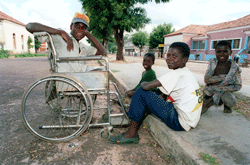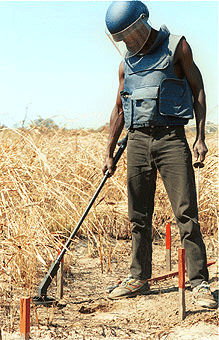In Cambodia there is one landmine for every man, woman and child. An estimated 10-15 million landmines are remnants of the long civil war in Angola. Egypt is thought to be the world’s most heavily mined country, with mines dating back to the battle of El Alamein during World War II. And in 2001 India and Pakistan laid over 1 million landmines along their border in Kashmir.
In December 1997, 122 governments gathered in Ottawa, Canada to sign the Convention on the Prohibition of the Use, Stockpiling, Production and Transfer of Anti-Personnel Mines and on their Destruction. The governments of the world have acknowledged the limited military utility of anti-personnel mines and the needless human suffering they cause.
From my experience in peacekeeping,
I have seen first-hand the literally crippling effects of landmines and
unexploded ordnance on people and communities alike. Not only do these
abominable weapons lie buried in silence and in their millions, waiting
to kill or maim innocent women and children; but the presence –
or even the fear of the presence – of a single landmine can prevent
the cultivation of an entire field, or rob a whole village of its livelihood,
place yet another obstacle on a country’s road to reconstruction
and development.”
Kofi Annan, UN Secretary-General,
April 1999

Young
landmine victim, Angola

Demining,
Angola
The problem
Despite ongoing stockpile destruction programs, an estimated 225-240 million anti-personnel mines are held by 100 countries and nearly 80 million more contaminate the land of some 80 countries. Landmines claim over 24,000 victims annually. Upon contact with a person blast mines injure or kill through the force of the blast, while fragmentation mines project shrapnel. Survivors of the initial explosion often require amputation of a limb, while many more die because they cannot reach medical care in time. The prohibitive costs of medical care, rehabilitation and prosthetic limbs, leave many victims disabled and unable to provide for themselves.
Landmines, or even fear that an area is mined, cause people to abandon the land. They are left without homes, a means to produce food or to provide for their families. Whole communities are affected as post-conflict reconstruction is stalled by the presence of mines. Clearing mines from large tracts of land is a time-consuming and dangerous task, typically relying on metal detectors or manual excavation. The difficult process of tracking randomly placed mines and the expense of clearing them means that many former conflict zones remain inaccessible long after the fighting has stopped.
The international response
The Ottawa meeting which brought about the 1997 Mine Ban Treaty was the culmination of a remarkable campaign, initiated with the challenge of the Canadian government and led by an international coalition of non-governmental organizations, including churches. The International Campaign to Ban Landmines (ICBL) was formed in 1992 and in 1997 received the Nobel Peace Prize for its efforts to achieve the Treaty. The ICBL continues its work by publishing The Landmine Monitor, a compilation of progress reports that monitor compliance to the Mine Ban Treaty. The World Council of Churches and many of its member churches are among the 1,300 organizations to participate in the ICBL.
Even with a treaty in force, there remains
much to be done to rid the world of landmines. Fifty countries have yet
to sign the Mine Ban Treaty. Some of these include Russia, the US and
China, who have the world’s largest landmine stockpiles; India and
Pakistan, who produce landmines and share a heavily mined border; and
Iran, Iraq, Serbia and Vietnam, who have not signed an export moratorium.
Universalization of the Treaty, committing all states to its plan for
the eradication of anti-personnel mines, is imperative.
Yet even if no more landmines are ever laid, those currently in use will
continue to maim and kill for years to come. Mine action is urgently needed
in heavily infested regions to prevent further suffering, including education
and risk reduction particularly for children; mine clearance; and stockpile
destruction. Those who have already been affected by landmines require
physical rehabilitation and long-term support.
The Mine Ban Treaty applies only to anti-personnel mines, not anti-vehicle mines or cluster bombs. In some regions failed cluster bombs, which release hundreds of bomblets to detonate across a wide area, have claimed more victims than anti-personnel mines. All forms of unexploded ordnance pose a threat to civilians in post-conflict zones and there is a need to expand the ban on landmines to include all explosive remnants of war.
The response of the WCC
In support of the Mine Ban Treaty, the World Council of Churches stated: “We affirm the sanctity of human life as persons are made in the image of God, and thus oppose all dehumanizing and life-destroying forces, including the manufacture and deployment of such cruel instruments as landmines.” (September 16, 1997)
Churches see first hand the suffering landmines inflict upon civilians living in zones of conflict or post-conflict. As witnesses to this suffering, churches have a moral responsibility to advocate for mine victims, calling all states to stop producing and laying landmines, to clear mined areas and assist civilian victims. There is much work yet to be done in fulfilling the WCC’s 1997 call that “all states ratify (the Treaty), committing themselves to its full and immediate implementation.”
Through their daily ministry in mine-infested regions, churches address the physical and spiritual needs of those maimed by anti-personnel mines and the victims’ families. Actively working to “turn swords into ploughshares”, churches can support efforts to clear landmines so mined lands can be used for productive purposes. And the churches worldwide must continue to be agents for peace, joining together in the Decade to Overcome Violence: Churches Seeking Reconciliation and Peace (2001-2010), to promote reconciliation and an end to the conflicts that use landmines.
“…They
will beat their swords into plowshares and their spears into pruning hooks.
Nation will not take up sword against nation, nor will they train for
war anymore.” Isaiah
2:4
Practical Ways to Get Involved:
“The limited military utility
of anti-personnel mines is far outweighed by the appalling humanitarian
consequences of their use in actual conflicts. On this basis their prohibition
and elimination should be pursued as a matter of the utmost urgency by
governments and the entire international community.”
Anti-personnel mines: friend or foe?
: A study of the military use and effectiveness of anti-personnel mines.
International Committee of the Red Cross, 1997

“Campaiging for the abolition of landmines” is one aspect of the Peace
to the City Seven-Point Peace Plan
JOIN
THE PEACE TO THE CITY NETWORK!
Let us know who you are and what you are doing! Let the World Council
of Churches know about the work you are doing so we can let others know
and join you. Let us know how our programme can help with information
and link you up with others who have the expertise.
Back
to main Peacebuilding and Disarmament page
Back to the WCC and Microdisarmament page